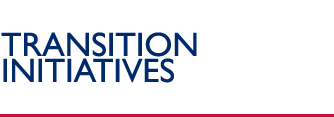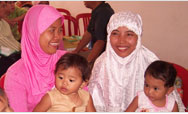Diamonds to Fund Development, Not Wars
USAID/OTI's BRDG-Liberia program (or the Building Recovery and Reform through Democratic Governance program) was launched in September 2006 to support the political transition prompted by the free and fair election of President Ellen Johnson Sirleaf, the first democratically elected female head of state in Africa.
The program helps further three specific political objectives:
- Assist the Government of Liberia and other key actors to improve capacity, with an emphasis on communication systems;
- Assist the Government of Liberia and other key actors to mount effective political responses to high-visibility issues;
- Support regional activities aimed at strengthening the Mano River Union.
The USAID Mission in Liberia, USAID's Africa Bureau, and the Office of Democracy and Governance are key players in the coordination of the BRDG program.
 |
| Liberia exported its first shipment of Kimberley Process-certified diamonds in September. |
In 2001 the international community banned the export of diamonds from Liberia, seeking to stifle the illegal trade that had fueled regional armed conflicts for decades. Six years later, the Liberian Government’s persistent efforts to meet the criteria for removal of the ban were successful, and the United Nations lifted the diamond sanctions. On May 4, 2007, Liberia was admitted to the Kimberley Process (KP), which is the system designed to prevent diamonds from being used to fund wars. Diamond-trading activities officially began in late July, but these activities were contingent on the Liberian Government’s ability to establish credible measures to ensure that Liberian diamonds are traded through official channels and that the funds generated by the trade are used for the welfare of the people and the development of the country.
To facilitate the country’s emergence as an exporter
of legal diamonds, USAID’s Office of Transition Initiatives (OTI), at the request of the Ministry of Lands, Mines and Energy, engaged a consultant to provide training, advice, and support to the Ministry and the KP Certificate Scheme Working Group. The consultant also assisted with strategic communications campaigns to inform stakeholders about the Kimberley Process and provided support to the Mano River Union’s efforts to standardize export taxes in the mining sector and reduce incentives for smuggling.
After meeting the requirements for KP compliance, Liberians now stand to benefit from the country’s dia¬mond exports, and on September 6, as a direct result
of these efforts, Liberia exported its first shipment of
KP-compliant diamonds, valued at US$222,000. The government received a 3 percent royalty on the transaction (or US$6,660), which will help fund development projects.
According to Liberia’s Minister of Information, the government adopted the KP protocols because it wants
to be transparent with the country’s resources. Moreover, Liberia’s leaders want to attract legitimate miners and dealers to the diamond trade. This aspiration reflects positively on the still-young government.
For further information, please contact:
In Washington: Donna Kerner, Deputy Team Leader, 202-712-0716, dkerner@usaid.gov
|


